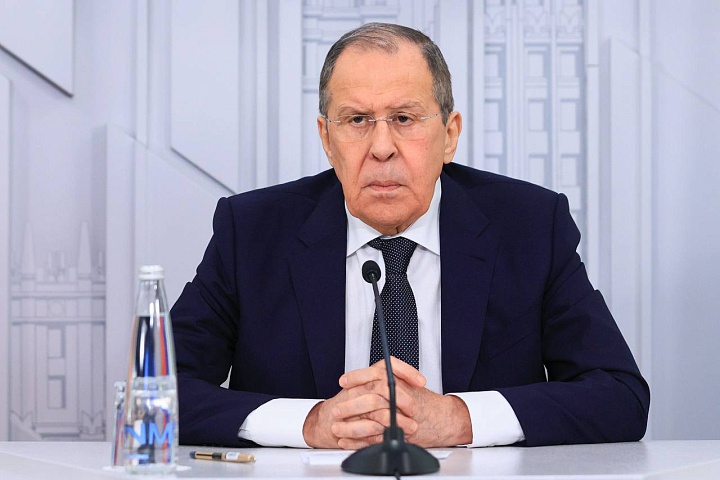Foreign Minister Sergey Lavrov’s answers to media questions, Moscow, May 23, 2025
From May 20 until 8:00 am on May 23, the Ukrainian side launched a record number of combat drones - 788 in total - against civilian targets and civilians in Russia. All attacks were repelled, though, regrettably, there are fatalities and injuries. The Foreign Ministry issued a special statement to this effect, which is being widely circulated among governments and international organisations.
We believe these attacks are a direct result of the support provided to Ukrainian Nazis, primarily by a number of European countries, led by the United Kingdom, France, Germany, and the EU leadership. We are convinced that they bear a portion of responsibility for these crimes. We will push to bring an end to this policy.
We are witnessing a clear attempt to derail peace talks and disrupt the process that began in Istanbul following an agreement between President Vladimir Putin and President Donald Trump which included a 1,000 for 1,000 prisoner exchange and further work on documents setting out specific conditions and requirements that are necessary to reach an agreement. We will continue working on that despite provocations.
Question: Does Russia remain committed to a peaceful settlement?
Sergey Lavrov: Yes, we remain committed to a peaceful resolution. We remain open to talks. President Putin has confirmed this many times publicly and in his conversations with foreign leaders.
Please note that we fully complied with every goodwill gesture we ever made, including ceasefires during Orthodox Easter and Victory Day, as well as the month-long moratorium on attacks on energy infrastructure, which we announced after President Putin and President Trump had a conversation. However, Ukraine disrupted these ceasefires as it continued to act aggressively and criminally even during the pauses in hostilities that we declared.
To reiterate, we are committed to the agreements recently reached by the Russian and Ukrainian delegations in Istanbul. We are finalising preparations for the 1,000 for 1,000 prisoner exchange.
We are also working hard on the second part of the agreement, which involves each party preparing a draft document outlining the terms for achieving a durable, lasting, and comprehensive resolution. Once the prisoner exchange is completed, we will be ready to present our draft to the Ukrainian side. The Russian side is in the process of finalising this document.
Question: You mentioned that international organisations would be informed about the Foreign Ministry statement. How do you expect them to react?
Sergey Lavrov: I expect that their response will be grounded in the foundational documents that underlie the work of institutions like the United Nations, the OSCE, and other multilateral entities. These documents clearly prohibit attacks on civilian infrastructure during hostilities. This principle is also upheld in various conventions that define the principles of international humanitarian law.
These principles have been repeatedly violated by Kiev all these years. Kiev violates the accepted rules of warfare and shows little willingness or capacity to act as a responsible member of the international community.
We look forward to a response from the UN. So far, statements made by Secretary-General Antonio Guterres and his official representatives for as long as the special military operation has been underway suggest reluctance - or inability - to carry out their basic duties, especially those relating to upholding the principles of the UN Charter.
Question: In the past few weeks, numerous EU leaders and officials visited Kiev, including Emmanuel Macron, Keir Starmer, Friedrich Merz, and Kaja Kallas, among others. Following their visits, there was a noticeable surge in terrorist attacks carried out by Kiev. Do you believe there’s a link? Should Zelensky’s foreign backers bear a portion of responsibility for killing civilians?
Sergey Lavrov: I believe the connection is undeniable.
Those sustaining the Kiev regime, including the figures you mentioned, don’t conceal their role. It’s not accidental that while we pursue a resolution via addressing the root causes of the conflict, they run amok demanding an immediate ceasefire without preconditions. That stance allows them to continue flooding Kiev with weapons.
Their public statements indicate they’re not prepared to change course which only fuels the conflict and emboldens Zelensky and his team to carry on with their criminal activities.
There certainly is a degree of European responsibility involved. I think that when the conflict is finally resolved, and its outcomes are assessed, it will be difficult for those backing Kiev to avoid accountability.
Question: Do you believe that the Western European leaders you mentioned are deliberately trying to thwart President Trump’s mediation efforts in the Ukraine conflict? Could jealousy be a factor?
Sergey Lavrov: I wouldn’t say it’s about jealousy. These leaders were simply more comfortable with the previous US administration, which was leading the charge in the anti-Russia crusade and encouraged European countries to follow suit.
Now, with the new administration in the White House, it's clear that they were more comfortable under President Biden. Their main objective was to preserve Western unity in what they described as an effort to deliver a “strategic defeat” to Russia on the battlefield.
If we take a closer look at the positions adopted by London, Paris, Berlin, Brussels, the Baltic states, and Warsaw, we’ll see that they have no way of abandoning their stated goal. They bet their reputations on drawing Europe into the war against Russia and using it as a pretext to militarise Europe. Massive investment will have been made to that end by 2030. Chancellor Friedrich Merz has openly stated his ambition to make Germany Europe’s dominant military power with the largest conventional army. This is alarming news, and historical reminiscences are conjuring up a disquieting picture.
Another possible motive behind their actions is that they still hope to use some people from the US establishment to bring President Trump and his administration back into an anti-Russia camp and share responsibility or even shift the blame. But I believe they won’t succeed this time.


